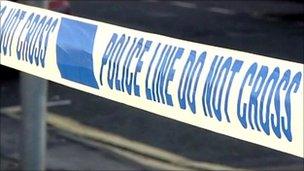Crime in England and Wales falls
- Published

Crimes against adults fell 6% in England and Wales for the year ending in June, compared with the previous year, official statistics show.
However, it was too early to conclude that there was an emerging downward trend in the latest Crime Survey for England and Wales, the Office of National Statistics said.
Crimes recorded by the police also fell by 6% in the same period.
This continues the downward trend in recorded crime seen since 2004/05.
All of the main categories of police recorded crime fell in the year ending June 2012 compared with the previous year. The period includes the August 2011 riots which erupted in London and spread to other English cities.
However, pick-pocketing - officially known as theft from the person - showed a 6% increase.
Theft from the person is a relatively low-volume offence, accounting for 3% of overall police recorded crime. The majority of such thefts happened without the victim being aware at the time of the offence.
The crime shows notable fluctuations from year to year in the Crime Survey.
Despite recent rises, the number of theft from the person offences recorded by police in the year ending June 2012 was 12% lower than in 2006/07 and 32% lower than in 2002/03.
Millions of crimes
However, it was too early to draw firm conclusions at this stage, as longer term comparisons suggest a relatively flat trend, ONS said.
Results from the latest Crime Survey - which asks people whether they have been the victim of any offences during the past year - showed statistically significant decreases for incidents of vandalism, vehicle-related theft and burglary with entry, compared with the previous year.
The overall level of crime recorded by the police dropped to 3.9 million in the 12 months to June.
However, the Crime Survey suggested that there were 9.1 million offences committed against households and resident adults in England and Wales and 0.9 million against children aged 10-15 living in such households.
Other statistics for the same period showed:
- Offences of violence against the person recorded by the police showed a 6% decrease compared with the previous year, continuing the decline seen since 2006/07.
- Homicide decreased by 14% and attempted murder fell 12%, and violence against the person with injury decreased by 8%.
- Levels of violent crime estimated by the Crime Survey showed no statistically significant change in the year.
Crime Prevention Minister Jeremy Browne said the statistics showed that people had "the lowest chance of being a victim of crime since the survey began in 1981."
He linked the drop to government moves that have "swept away central targets and reduced police bureaucracy."
He added: "This shows that how the police are deployed, rather than their absolute numbers, is what is key to cutting crime."
Deputy Chief Constable Douglas Paxton of the Association of Chief Police Officers said: "What is important to note is that these overall crime reductions have been achieved at a time when forces are facing significant cash savings.
"The service remains determined to continue to build on the good work reflected in these publications and the results are a credit to those officers and staff who have faced the challenge of major efficiencies, while continuing to tackle crime in our communities."
Labour MP David Hanson, the shadow policing minister, said there were still areas for concern within the falling statistics.
"Any fall in overall crime is welcome, but I'm sure the government would agree that crime remains too high with 9.1 million offences recorded in the survey," he said.
"The increase in theft from the person, with crimes such as muggings, is also a matter for concern.
"We need to ensure everything is being done to tackle crime to follow the fall in crime of over 40% that Labour achieved. Cutting 15,000 police officers from across the country shows the government are simply not doing everything they can."
- Published19 April 2011